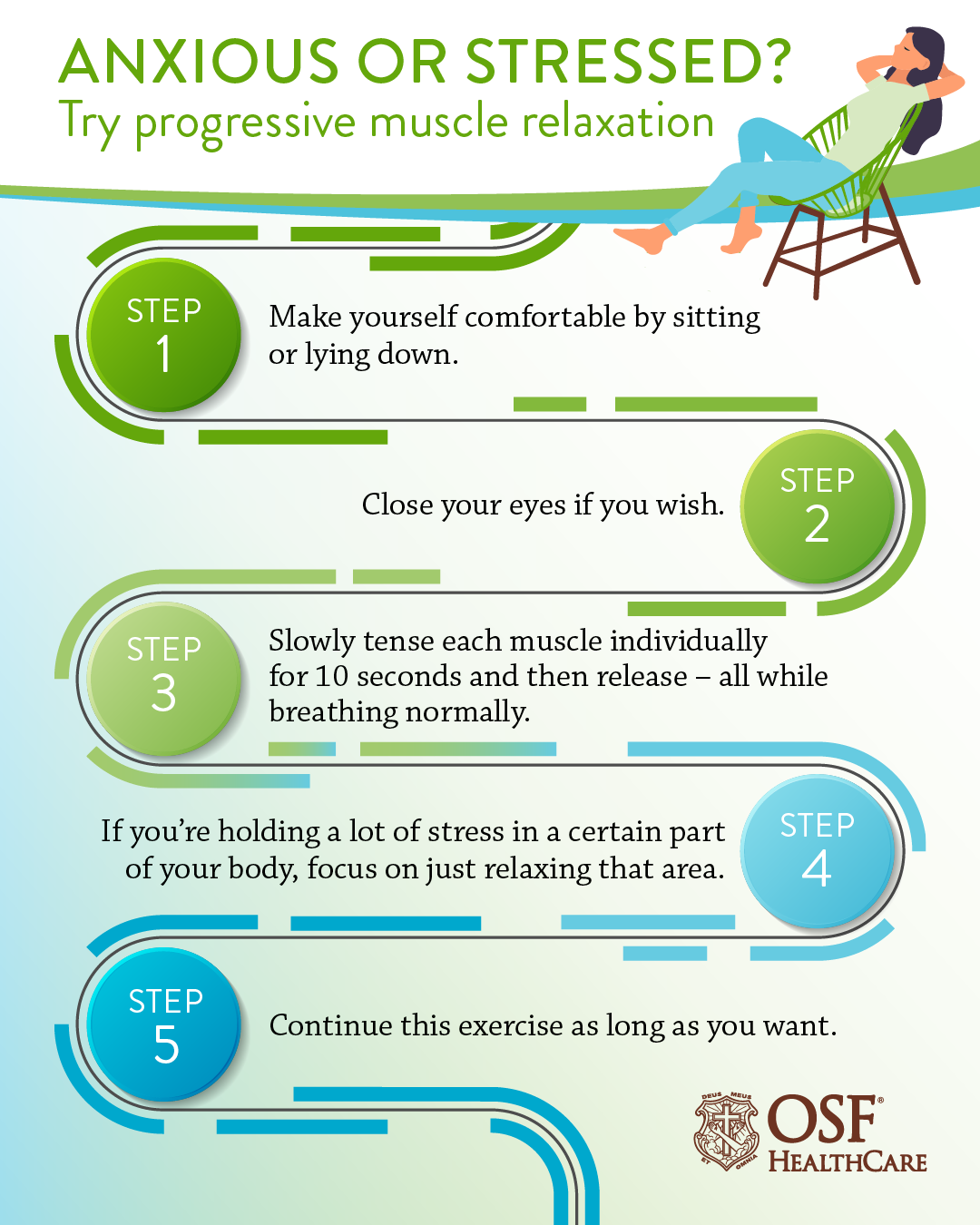
Anxious or stressed? Try progressive muscle relaxation
Find help online for stress, anxiety and depression
Many things in life can cause us to feel stressed or anxious. From the everyday pressures of paying bills and raising kids to the relatively new phenomenon of trying to avoid a virus during a pandemic, there’s no shortage of things that can cause us to worry.
But with so much on our minds, how do we keep from being crippled by fear of the unknown? Vicki Kamhi, a counselor at Saint Francis Medical Center College of Nursing, says we can recognize and challenge our fear-based thoughts and practice different ways to relax, such as progressive muscle relaxation.
Avoid the urge to “what if”
“When we focus on a ‘what if’ thought that something bad could happen, this negative thought triggers the fight-or-flight response in our nervous system,” Vicki said. “While fight-or-flight is an appropriate response during a dangerous situation, our ‘what if’ thoughts, which are based on a perceived danger that is not real, create the same stress response. This can put our bodies on high alert for a sustained period of time, and it’s widely recognized that chronic stress negatively affects our physical and mental health.”
So, how should we handle fearful thoughts?
“You can’t control when a thought happens to pop into your head, but you can control how you respond,” Vicki said. “Thoughts are not necessarily facts. I have a sign in my office that says, ‘99% of the things you worry about never happen,’ and it’s true. The key to reducing our stress and anxiety is to avoid focusing on ‘what if” questions and, instead, focus on being in the present.”
Progressive muscle relaxation
While focusing on the present may seem difficult, anyone can do it through progressive muscle relaxation. Here’s how:
- Make yourself comfortable by sitting or lying down.
- Close your eyes if you wish.
- Begin the process of slowly tensing and relaxing each muscle in your body. Tense one muscle at a time, squeeze as tightly as you can, hold for 10 seconds and then release. Start at the top of your body and progressively work your way down or start at the bottom and work your way up – all while focusing on normal breathing.
- If you’re holding a lot of stress in a certain part of your body, focus on just relaxing that area.
- Continue this exercise as long as you want.
“Progressive muscle relaxation helps you activate your body’s natural relaxation response, which lowers your body’s fight-or-flight response and reduces stress,” Vicki said. “It also keeps you focused on the present, and when you’re in the present, you’re not worrying about what might happen in the future.”
Other mental and physical benefits of relaxation
Relief from stress and anxiety aren’t the only benefits of progressive muscle relaxation.
“When we’re relaxed, we are able to regain self-control,” Vicki said. “Our insight and judgment improve, so we’re able to make better decisions. We can pause and take time to respond to others in a kinder, more helpful way. It also makes it easier to be grateful for all the good things in our lives.”
Progressive muscle relaxation can even help you cope with physical pain. By relaxing and being in the present moment, you reduce your stress response and can often relieve some of the pain you’re experiencing.
One of many tools
Progressive muscle relaxation is one of numerous coping tools that fall under the category of mindfulness, which is all about being present in your current situation instead of anxious about the future. Other techniques include:
- Deep breathing: Inhale through your nose for four seconds, hold for two seconds, and gently exhale through your mouth for four seconds. Do this for at least two minutes.
- The 5-4-3-2-1 grounding technique: Look around yourself and notice five things you see, four things you can touch, three things you hear, two things you smell, and one thing you can taste.
- Think about or actually walk through peaceful settings, such as a park or garden.
- Listen to recordings that help calm the mind, such as water gently flowing in a stream or running over a waterfall.
“Remember, there is a strong connection between your mind and body,” Vicki said. “When you’re feeling stressed or anxious, give yourself permission to take a timeout to do at least one of these exercises. Taking a few minutes can help you avoid getting caught up in mental stories that can steal the peace from your day.”
